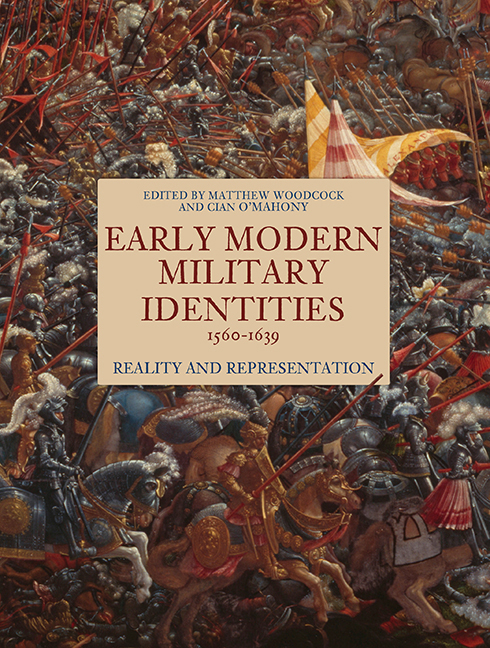Book contents
- Frontmatter
- Contents
- List of Illustrations
- List of Contributors
- Acknowledgments
- List of Abbreviations
- Introduction
- Part I Models of Military Identity
- Part II Military Identities in Early odern Ireland
- 5 The Clergy and the Military in Early Modern Ireland
- 6 ‘Trust, Desert, Power and skill to serve’: The Old English and Military Identities in Late Elizabethan Ireland
- 7 Artifice in Ormonius: Why a Renaissance Latin Epic Falsified the Military History of a Tudor Irish General
- 8 Irish Savage and English Butcher: Military Identities and Tyrone's Rebellion, 1593-1603
- 9 A print in my body of this day's service’: Finding Meaning in Wounding During and After the Nine Years War
- Part III Staging Military Identities
- Afterword: The Way Ahead
- Bibliography
- Index
8 - Irish Savage and English Butcher: Military Identities and Tyrone's Rebellion, 1593-1603
from Part II - Military Identities in Early odern Ireland
Published online by Cambridge University Press: 14 September 2019
- Frontmatter
- Contents
- List of Illustrations
- List of Contributors
- Acknowledgments
- List of Abbreviations
- Introduction
- Part I Models of Military Identity
- Part II Military Identities in Early odern Ireland
- 5 The Clergy and the Military in Early Modern Ireland
- 6 ‘Trust, Desert, Power and skill to serve’: The Old English and Military Identities in Late Elizabethan Ireland
- 7 Artifice in Ormonius: Why a Renaissance Latin Epic Falsified the Military History of a Tudor Irish General
- 8 Irish Savage and English Butcher: Military Identities and Tyrone's Rebellion, 1593-1603
- 9 A print in my body of this day's service’: Finding Meaning in Wounding During and After the Nine Years War
- Part III Staging Military Identities
- Afterword: The Way Ahead
- Bibliography
- Index
Summary
The Nine Years War, also known as Tyrone's Rebellion, raged across Ireland for ten years from 1593–1603, as a confederation of Irish lords led by Hugh O'Neill, second earl of Tyrone, almost succeeded in extinguishing English power in Ireland. It retains a popular image of being a guerrilla war by Irish lords to throw off English rule that was ultimately doomed to failure, since primitive Ireland could never hope to match the economic and military strength of Gloriana's England. The conflict has often been portrayed as a no-holds-barred conflict in which brutality was the norm. The orgy of bloodshed and cataclysmic famine in Ulster which brought the war to its close helped cement this image. The war in Ireland generated a reputation in Europe as one of uncommon savagery, with subsequent English publications attributing the bulk of that aggression and cruelty to the Irish. This appears very neat and uncontentious. However, the narrative is riven with fabrications which began during the war and have proliferated in modern historiography.
Many assumptions about the nature and course of the war are not borne out by the evidence, yet they continue to permeate the historiography of the conflict. Two of the most pervasive strands of this myth are of particular concern: the primitivism of the Irish, and the savagery of the English campaign to suppress the Gaelic lords. In truth, the Irish were anything but primitive, and in many ways were more advanced and adaptive than their English adversaries. Nevertheless, both English and Irish writers sought to portray the Irish as crude and unsophisticated. The modern critical vogue for equating the closing stages of the war with genocide is equally founded upon questionable sources. A reassessment of the contemporary accounts suggests the horrors in Ulster were overstated at the time, and later interpretations have emphasised aspects of the devastation caused by war to apportion blame to one side of the conflict, in this case the English. Whilst English officers and soldiers did not view themselves as bloodthirsty or acting contrary to accepted norms, the popular and academic interpretation of the conflict has often been one of untrammelled cruelty by crown forces.
- Type
- Chapter
- Information
- Early Modern Military Identities, 1560–1639Reality and Representation, pp. 177 - 196Publisher: Boydell & BrewerPrint publication year: 2019



